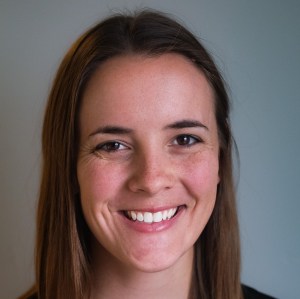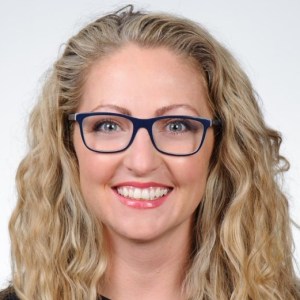How HFMA/Boise State master’s degree cohort members are putting new knowledge to work

When Grayson Johnston, CHFP, learned about the HFMA/Boise State University Master in Population and Health Systems Management (MPHSM) degree, she knew she’d found just the program she had been searching for during the past two years.
“I looked at healthcare-focused MBA programs, MPH programs and MHA programs, but couldn’t find the right fit for what I was hoping to study,” said Johnston, a vice president on the Healthcare Industry Solutions Specialists team at J.P. Morgan Chase & Co. in New York. “Each program I looked at had pieces of the equation, but not the holistic approach I was looking for that would include topics like population health, public health, actuarial science and the business of healthcare.”
HFMA and Boise State University unveiled their collaborative program in 2021. The degree, conferred by the Boise, Idaho-based university, addresses the modern needs in healthcare education through the lenses of population health, risk mitigation and finance. It explores the relationship between epidemiology and actuarial science in the context of population health, and then operationalizes the theory and brings to practice the business intelligence and management skills necessary to be successful in the changing healthcare landscape.
“The program is designed for students to gain background and experience in both the investment in population health and techniques to move the industry toward care that recognizes the most valued approach,” said Todd Nelson, HFMA’s director, partner relationships and chief partnership executive.
Johnston, who has covered the healthcare industry for about five years, said the program is equipping her with a broader understanding of historical patterns, emerging trends and opportunities to drive change and innovation along with deeper context and understanding of both the payer landscape and regulatory changes shaping the broader industry.
“With this knowledge, I have been able to better understand client needs and challenges,” Johnston said. “I am now able to incorporate my understanding of actuarial science, insurer objectives and regulations into constructing appropriate solutions and best practices for clients that meet regulatory requirements and satisfy mutually beneficial objectives between payers, providers and patients.”

Jacob Dalmas is another student using what he’s learned in the program at work. Dalmas said he is “thrilled to be practicing [preventive medicine]” in his clinical risk manager position at Saint Alphonsus Health System in Boise because the topic was spotlighted in the first semester of the program.
“I have seen a focus on readmissions and how we can decrease the amount of people that return to the hospital within a certain amount of time,” he said. “I believe medicine can be shifted, and I have directly worked with nurses and providers that are treating the whole patient and not just the problem occurring at that time.”
For Abby Birch, regional vice president, business development, with Cloudmed in Atlanta, participation in the program has expanded her network “tremendously.”
It has also inspired her to start a masterminds group comprising people who work in the industry to initiate a conversation about possible areas where action is needed to resolve key industry challenges.

“When we learn about a particular topic in class, I go out to the industry and reach out to my contacts to have a conversation with somebody who actually does this in their job every day,” Birch said.
For example, she reached out to Philip Boyce, the chief revenue officer at Baptist Health in Jacksonville, Florida, who connected her to Mary Leen, Baptist’s leader of population health.
“[Leen] and I spent some time together, where I asked questions and she shared her approach to population health in Jacksonville, how they’ve had one of the most successful ACOs and some things they did during COVID to bring hospital-at-home solutions to their community to keep people out of the hospital.”
Why is participation in the MPHSM program and convening the masterminds group so important to Birch?
“[Cloudmed is] a safety net, revenue integrity service provider to hospitals, and last year we recovered $1.7 billion as the last look for our clients,” Birch said. “So think about all the people, process, the technology that touched those accounts before we got to it — and we’re one business partner and we recovered $1.7 billion. That to me is evidence that we have an incredibly broken healthcare system. I’m constantly seeing these denial issues and underpayment issues and just all these challenges. And I am desperate to help be a part of some kind of fix, and why I love HFMA’s cost effectiveness of health [initiative].”
For anyone unsure about whether they would benefit from the curriculum, Birch said it’s worth the time and effort.
“It opens up your mind to different thinking, which can improve problem-solving in your everyday life, and especially around your job,” she said.
Johnston agreed, saying, “Regardless of how long you have worked in the healthcare industry or in what capacity, you will benefit from participating in this program.”
For more information, visit boisestate.edu/phsm.
Who would find value in the MPHSM program?
The Master in Population and Health Systems Management (MPHSM) degree would be of value to various roles within the healthcare finance industry, such as:
- Actuarial Analyst
- Actuary
- Chief Actuary
- Chief Nursing Officer
- Chief Strategy Officer
- Clinic Manager
- Clinical Officer
- Director of Actuarial Services
- Director of Benefit Services
- Director of Financial or Clinical Analysis
- Director of Financial or Clinical Operations
- Director of Health Plan Strategy
- Director Population Health
- Director of Strategy or Strategic Planning
- Finance Manager
- Government
- Health Case Manager
- Healthcare Actuary
- Healthcare Administrator
- Healthcare Billing Manager
- Healthcare Consultant
- Healthcare Financial Analyst
- Healthcare Operations Manager
- Insurance Analyst
- Nurse Manager
- Nursing Manager
- Population Health Manager
- Provider Engagement Consultant
- Revenue Cycle Manager
- Senior Actuarial Analyst
- Senior Consultant and Actuary
- Vice President Actuarial Services
- Vice President Benefit Plans
- Vice President Insurance Services
Many other job titles could benefit from participation in the MPHSM program.





